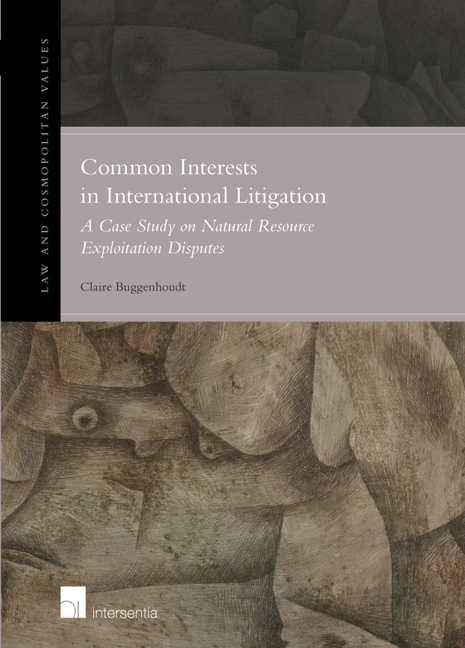Book contents
- Frontmatter
- Acknowledgements
- Contents
- Table of Cases
- List of Abbreviations
- Chapter 1 Introduction and Research Design
- Chapter 2 Procedural Considerations and Common Interests
- Chapter 3 Substantive Considerations and Common Interests
- Chapter 4 A Common Approach to Common Interests
- Chapter 5 General Conclusion
- Bibliography
- Index
- Law and Cosmopolitan Values
Chapter 4 - A Common Approach to Common Interests
Published online by Cambridge University Press: 27 September 2018
- Frontmatter
- Acknowledgements
- Contents
- Table of Cases
- List of Abbreviations
- Chapter 1 Introduction and Research Design
- Chapter 2 Procedural Considerations and Common Interests
- Chapter 3 Substantive Considerations and Common Interests
- Chapter 4 A Common Approach to Common Interests
- Chapter 5 General Conclusion
- Bibliography
- Index
- Law and Cosmopolitan Values
Summary
REASONS FOR (IN)CONSISTENCY IN INTERNATIONAL LITIGATION ON COMMON INTERESTS
INTRODUCTION
The introduction to this book highlighted two important evolutions in international law. The first evolution concerns the purpose of international law. International law was established as a system to protect the sovereign State ‘ s rights and interests. In spite of its traditional focus on sovereignty, it evolved into a regime that subjects State measures to judicial scrutiny and aims to preserve and protect what is defined as common interests. These interests, such as human rights protection and environmental preservation, were once considered to fall strictly within the sovereign power of the State but are now explicitly recognised as common interests in international law. A second evolution took place at the level of the international judiciary. The vast proliferation of mainly specialised international judicial bodies has led to concerns about the incoherent application of international law and the possible consequences of inconsistent decision making, such as forum shopping. The latter concern is even more pressing in the context of common interest protection because the proliferation of international judicial bodies is incomplete and not every common interest identified in international law is protected by a specialised international court.
Starting from the observations above, the book examined whether there is inconsistency in the international case law that addresses common interests. It explored how respect for common interests is enforced in the proliferated judicial system that exists today. Both in procedural and substantive decisions, similarities and differences were identified in the methods used by the studied courts and tribunals to deal with such interests. At the procedural level, the decisions of the examined judicial bodies show a clear convergence and, in general, an open attitude to interests that go beyond the case-specific jurisdiction of the mechanism. When considering the merits of the dispute, the studied judicial bodies approve and take account of public interest concerns. Growing judicial integration was found in the interpretation of the so-called public interest exceptions. However, it was also established that each institution makes sure to keep the focus of its decision on the consent of the parties and the values protected in the Treaty that grants jurisdiction.
- Type
- Chapter
- Information
- Common Interests in International LitigationA Case Study on Natural Resource Exploitation Disputes, pp. 149 - 180Publisher: IntersentiaPrint publication year: 2017



